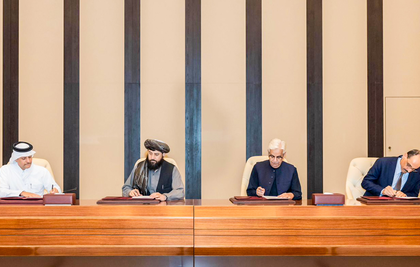Taliban limits Pakistan’s Afghan strategy: Report
By IANS | Updated: November 18, 2025 21:40 IST2025-11-18T21:36:29+5:302025-11-18T21:40:19+5:30
Islamabad, Nov 18 Pakistan’s influence in Afghanistan rested on longstanding ties with Afghan insurgents, cross-border sanctuaries for proxies ...

Taliban limits Pakistan’s Afghan strategy: Report
Islamabad, Nov 18 Pakistan’s influence in Afghanistan rested on longstanding ties with Afghan insurgents, cross-border sanctuaries for proxies and a security establishment that believed it could coax Kabul, a report said on Tuesday.
It added that after the Afghan Taliban’s return to power in 2021, Islamabad briefly assumed these ties would give it control over insurgent groups threatening Pakistan’s internal security, particularly the Tehrik-e-Taliban Pakistan (TTP) — an assumption that has been proven to be increasingly fragile.
"For decades, Islamabad regarded Afghanistan as a strategic depth and a zone of influence — a buffer to be shaped, not simply neighboured. That assumption has been upended. What was once a relationship of patronage and leverage has become a volatile adversarial space in which Pakistan’s ability to shape outcomes is eroding fast," a report in the UK-based media outlet Milli Chronicle detailed.
“The proximate causes are familiar: the Tehrik-e-Taliban Pakistan’s (TTP) resurgence, the Afghan Taliban's evolving priorities, and renewed regional manoeuvring — but the deeper story is institutional: Pakistan’s coercive and diplomatic instruments have less purchase in Kabul than they did a decade ago, and the result is a dangerous ambiguity for peace along a porous frontier,” it added.
According to the report, in Pakistan, the domestic politics around counter-terrorism and the resurgence of the Pakistani Taliban have reshaped official thinking.
“Policymakers face a grim choice: assertive military options across the border that risk escalation and international censure, or a patient diplomatic strategy that depends on a Kabul willing and able to act,” it stressed.
The ambiguity, the report said, has fueled episodic violence rather than a durable settlement with ceasefires brokered and violated and confidence-building measures remaining fragile. Citing observers, it stated that Islamabad’s traditional tools — patronage networks, cross-border pressure and economic inducements — are necessary but insufficient to resolve the multi-layered conflicts now unfolding.
The report emphasised that human cost is immediate, with civilians on both sides of the Durand Line bearing the brunt of the violence through displacement, disrupted trade and a renewal of mistrust that undermines prospects for long-term reconciliation.
“The border is not simply a line on a map; it is a lived geography of interdependence and grievance. As violence spikes, international actors — from Qatar and Turkey to regional capitals — are scrambling to re-establish mediation channels even as the ground reality resists neat diplomatic fixes,” it noted.
Disclaimer: This post has been auto-published from an agency feed without any modifications to the text and has not been reviewed by an editor
Open in app